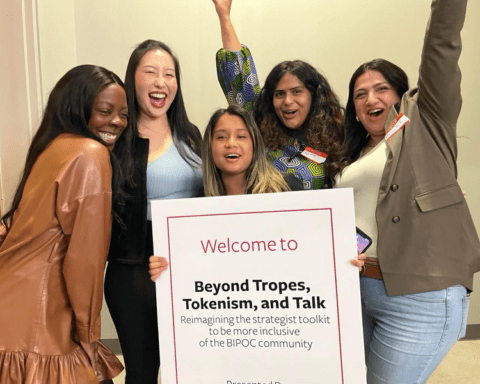“I am forever grateful to that hiring manager—I learned so much from her.”
Vivian Li, a senior manager for a local bank, is recalling her first mentor in the workplace. As a volunteer at a health research organization in Toronto, Li had been working the front desk in the recruitment department when this manager posted a contractor job.
“Even though I didn’t have much experience, I guess it was my passion for the topic that impressed the hiring manager,” she says.

After completing a certificate in human resources management, Li found difficulty landing a job. She had also recently immigrated from China, so she had no Canadian work experience.
Li came to Canada in 2003—a time when there wasn’t much inclusivity or support for racialized staff in the workplace, she says.
Nonetheless, as a volunteer, she expressed her interest in the contract role.
“Among all the applicants, [the hiring manager] decided to give me a chance,” Li says. Her two-month contract was extended twice.
It was a valuable work experience, says Li. The manager who took a chance on her was Black; Li says she learned a lot from her, including how to lead in the workplace and how to get things done.
“I’ve met some very good leaders who supported me as a newcomer,” she says. “I think that’s very important.”
“This is a marathon”
In March, the Toronto Region Immigrant Employment Council (TRIEC) released a report revealing that middle managers are key to creating workplaces that are inclusive of immigrants. TRIEC works with organizations in the Greater Toronto Area to address immigrant underemployment.
According to Make or Break: How Middle Managers and Executives Can Build Immigrant-Inclusive Teams, one-off diversity and inclusion training is not enough.

“The keyword is ‘journey.’ And I think a lot of organizations don’t realize that this is a marathon, not a sprint,” says CEO of TRIEC, Adwoa K. Buahene.
“A singular intervention is not going to change something that is either systemic or pervasive.”
Buahene explains that beyond committing to values such as inclusivity and diversity, executives need to create the space and time for the rest of the organization—particularly middle managers—to execute on these values.
“If I’m a middle manager, being held accountable for certain key performance indicators (KPIs)—such as production or client relationship management—how do I prioritize diversity and inclusion in all of those KPIs if it’s not set out for me? How do I layer it into my everyday operations?” says Buahene.
“So I do need assistance in figuring out how to do that. I’ll need the space and time to develop this competency.”
Supporting racialized newcomer women

The importance of middle managers is echoed by Maria Polovinka, program manager at Winnipeg-based Opportunities for Employment, a non-profit that provides employment assistance services.
“I would say that HR and middle management [are] part of teams that initiate really good practices in this regard,” Polovinka says.
OFE is a partner organization in the Career Pathways for Visible Minority Newcomer Women (CPVMNW) Pilot Project, a three-year research project facilitated by the Social Research and Demonstration Corporation (SRDC), a non-profit that conducts research to evaluate new programs.
The project is funded by Immigration, Refugees and Citizenship Canada (IRCC) under the Visible Minority Newcomer Women Pilot, a $31.9 million initiative. Launched in 2018 as part of the federal budget, the pilot is aimed at improving the employment and career advancement of racialized newcomer women by addressing the barriers they face from gender and race-based discrimination to the lack of access to child care and professional networks.
As a partner organization in the project, OFE worked on a program designed to help immigrant job seekers find work, transition to, and integrate into Canadian workplaces.
While newcomer women have unique employment challenges, Polovinka observes that employers, too, face an obstacle to hiring more newcomers: a lack of cultural competency.
“Employers with good knowledge in this area have a better understanding of the successful practices of training and retaining new staff,” she says.

Susanna Gurr, project director for the CPVMNW pilot, concurs. “When you’re talking about employment, it’s very important not to just focus on the participants or the individuals, but also bring in the demand side,” she says.
“If you offer support and training, but don’t connect them with jobs, it’s a little bit harder.”
The research itself is still ongoing, but the SRDC recently released an interim report on its findings from the program’s first year. The final report will be released in March 2022.
Ottawa will continue to invest in programs to help racialized newcomer women enter the Canadian labour market—it has allocated $15 million for this in the 2021 budget. Details have not yet been revealed on how this will be allocated.
Nonetheless, Polovinka says projects like the CPVMNW have been beneficial to the job seekers they work with.
“We’ve noticed that it’s crucial to continuously work with employer partners to be able to make positive, systemic changes that have already started happening through the project,” she says.
“We’ve seen changes that employer partners have started implementing that, if they continue being shared, then more and more employer partners would realize the benefits of hiring newcomers and the practices that will make this process easier for them.”
Cultural competency: A leadership skill
As a skill, cultural competency poses a learning curve for everyone—including middle managers with immigrant experiences, says Buahene of TRIEC.
“There’s a plethora of leadership competencies. Being an inclusive leader is a competency that needs to be developed over time,” says Buahene.
“If I’m an immigrant that comes from a particular value set or belief system, it doesn’t necessarily mean that when I’m in the workplace, I know how to respond effectively and create an inclusive team with somebody who comes from a different [set of] cultural practices,” she says.
“Therefore [we’re all] accountable to ensuring that we’re continuously on this journey and that we continuously check our blind spots.”
It’s a skill that’s key to creating a diverse pipeline in an organization.
“If you say 30 per cent of [your staff is] visible minorities, if the majority of them are at entry-level, that’s not a very good indication of your diversity inclusion practice,” says Li, herself a senior manager in inclusive recruitment at her workplace.
“You need to have a [diverse] pipeline for middle management—it’s extremely important because when you don’t develop the middle management, you don’t have a pipeline when you want to promote someone [with a diverse background],” she adds.
“Diversity at the executive level—that’s the most convincing KPI you [can] measure.”
Johna Baylon is a freelance journalist and writer based in Vancouver, B.C. She is also NCM's Local Journalism Initiative Reporter. She is drawn to stories around immigration, care work, and communities in the diaspora. Born in the Philippines, Baylon grew up in Hong Kong, where she covered food and design as a writer and editor prior to moving to Canada in 2019. Find her on Twitter @johnabaylon.




